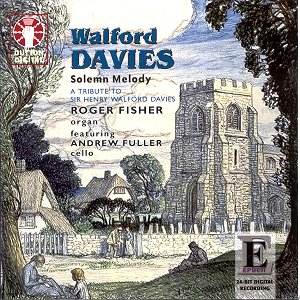Sir Henry WALFORD DAVIES (1869-1942)
Solemn Melody (version for cello and organ, arr. comp. rev. Fisher)
(1), Jesu Dulcis Memoriae, Interlude in C, Fugue in B flat, Memorial
Melody in C, Reverie for Organ and Two Voices – "O Jesu, King most
Wonderful" (2, 3), Chorale, Solemn Melody
Joseph JONGEN
Prélude élégiaque, op. 47
Harold DARKE
Chorale-Fantasia on Darwall's 148th
Sir George THALBEN-BALL
Elegy in B flat (arr. Fisher) (1)
Elegy
Sir Charles Hubert Hastings PARRY
Chorale-Fantasia on the Old 100th
 Roger Fisher (organ),
Andrew Fuller (violoncello) (1), Simon Stiggear (treble) (2), Michael
Wakeham (baritone) (3)
Roger Fisher (organ),
Andrew Fuller (violoncello) (1), Simon Stiggear (treble) (2), Michael
Wakeham (baritone) (3)
Also two broadcast talks by Walford Davies recorded in 1937 (from BBC
Archive Recordings)
Recorded on the Rothwell organ at St. George's Church, Headstone, Harrow,
24-26/10/2000
 DUTTON Epoch CDLX
7108 [79.29]
DUTTON Epoch CDLX
7108 [79.29]
Crotchet
AmazonUK
AmazonUS Amazon
recommendations

The name of Walford Davies has tended to stay around.
Those who play for services in a Protestant church of almost any denomination
will know, idly flipping through the pages during a dull sermon, that
he wrote a lot of hymns no one ever sings (I can’t understand why some
people prefer his tune to "O Little Town of Bethlehem" in
place of "Forest Green" but I must say "Pentatone",
his tune to "It came upon a midnight clear", is quite gorgeous).
Some reference books will tell you that "Solemn Melody" is
still popular but I must confess that, though I knew it from a piano
score, I had never heard it played until now. Older people still remember
his broadcast talks, of which two are added as a postscript to the programme
proper. The Welsh accent and (especially) the Welsh intonation will
be enjoyed by anyone who likes listening to Sir Anthony Hopkins but
the content sounds a little twee today. He is also remembered for saying
"the chord of C major is the voice of God" and for telling
Vaughan Williams that he wrote the Solemn Melody on his knees, to which
the more down-to-earth RVW retorted that he wrote his Mass in G minor
on his backside.
This record is a demonstration that a little imaginative
programming does more to make a successful CD than a mere wealth of
high class material. What can you do if you’re an organist and you want
to pay tribute to a composer who published just one tiny piece (the
Prelude on Jesu Dulcis Memoriae) for your instrument? Quite a lot, it
turns out. For one thing there is actually another mature unpublished
piece, the Interlude in C, and a rather interesting one. After some
quiet fanfares whose harmonic sideslips create a slightly French effect
there swings in a quintessentially English theme in the manner of Eric
Coates. My first reaction to hearing such plainly light music on the
organ was to laugh but I enjoyed every minute of it. There are also
two student efforts, the Fugue and the Chorale, and arrangements by
Walford Davies himself of the Solemn Melody and the Memorial Melody
(in the same vein but not really so good). There is also a group of
pieces dedicated to Walford Davies. Of these, Jongen’s Prélude
has some fascinating harmonies, and Fisher’s registrations extract a
wealth of colour that is worth hearing for itself, but a little more
melodic distinction might have helped it along its weary way. Darke’s
spirited Prelude is made to seem ramshackle beside the grand inevitability
of Parry’s work. This is a noble piece, and a very complicated one;
the acoustic of the Headstone Church (where Walford Davies himself sometimes
played) is warm but short by ecclesiastical standards and for once we
hear all the details of the contrapuntal writing.
The Thalben-Ball Elegy is quite a find. Written in
memory of Walford Davies it is not only a beautiful piece, but it intriguingly
takes the Solemn Melody as its starting point, quoting a few notes here,
a few notes there, and just at the point where you’re saying "ah,
it’s the Solemn Melody" it goes its own way for a bit, then back
to the Solemn Melody again. We get it in two versions, one an arrangement
for cello and organ, and this is brings me to a rather endearing feature
of the programme, the way in which certain themes keep recurring, binding
it together like leitmotifs. The Solemn Melody is a case in point, and
Fisher goes along with the soloist’s very long-drawn tempi while revealing
later on that he prefers to play it considerably faster on his own (on
the whole I prefer the cello version, but might the right answer not
lie in the middle, avoiding both stagnation and loss of dignity?). With
the two versions of the Thalben-Ball this means four references to this
theme strategically spread over the CD. Also, the very beautiful Jesu
Dulcis Memoriae Prelude has a companion in the lovely duet which Walford
Davies wrote much later in life, reworking the same material.
I suppose this disc doesn’t answer the question whether,
say, the Symphony in G would be worth a hearing. Sooner or later we
need a chance to assess the once immensely popular oratorio "Everyman".
But congratulations on the imaginative planning which has made a real
listening experience out of what, on paper, looks like an exercise in
barrel scraping.
Christopher Howell

